- Home
- Regan Walker
The Twelfth Night Wager Page 11
The Twelfth Night Wager Read online
Page 11
Christopher felt suddenly transparent, as if the countess saw his past and all of his sins.
“On what do you seek advice, Lord Eustace?”
“May I speak freely? And in confidence?”
“You may.”
“I want to know how to win a reluctant woman, a woman who has already granted…ah, certain intimacies, but now pulls back to again become quite formal.”
The dowager countess seemed to consider his words for a moment. Then, taking a sip of her sherry, she said, “You must convince her you love her, sir. You do love her, do you not?”
He hadn’t thought about it. He wanted her, missed her in his life and in his bed. But did he love her?
“Perhaps I do. What then?”
“You must speak to her heart, Lord Eustace. Find those things she treasures, whether they be a walk in the woods”—she smiled, as if she knew all about their time at Wimpole—“or a fast gallop, or her love for a dog that once walked by her side. The lady has many wonderful attributes. You must try to see and embrace them all. It is not enough to seduce her, my lord. To win her love, she must be persuaded you understand her and accept who she is. And value it.”
The woman saw too much. But as he forced himself to think on her words, Christopher remembered something his father had said the year before he died. It is easy to love many women, son, and hard to love just one. At the time, Christopher had perceived the comment as wrongheaded condemnation of his rakish ways, but now he saw his father’s counsel in a different light. Loving many women was easy because, in truth, it meant that he loved none. Just as Ormond commented the night of the wager that Christopher’s way of handling women was not to have one at all. Now he understood what his friend truly meant. A lifetime spent loving one woman was hard because it meant loving her though good days and bad, pleasing her because it brought joy to do so. But the doing of that, he realized, was worth all the coin in the realm.
“I begin to understand…”
The countess studied him for a moment. “Yes, I can see that you do.”
“But is the lady amenable? She was rather insistent upon leaving me, according to her, so that I would not be leaving her.”
Lady Claremont smiled. “She is not indifferent to you, Lord Eustace. Of that you must be aware, certainly.”
“That is my fervent hope.”
He rose and bowed before the countess. “This has been most illuminating, my lady. And most helpful. Your wisdom is much appreciated. I am in your debt.”
“I’m glad you came, Lord Eustace.” She rose from the sofa. “I like rogues, you know. And you are perhaps the prince of rogues—the greatest challenge.” Then she chuckled. “My friend Lady Leisterfield has many good qualities, but she can also be stubborn. This should be most interesting!”
* * *
Christmastide was two weeks away and soon David would be home. Grace busied herself getting the house ready for him, hoping the activity would sooth her aching heart. She wondered how much taller her stepson would be, and if he would look even more like the painting of his father when the baron was in the prime of life.
Despite the attentions of Sir Alex that took her to the theatre or to dinner about Town, and her preparations for the holidays that consumed her waking thoughts, in the back of her mind was the awareness that Christmastide ended on Twelfth Night, the day Eustace would have to claim to have won or lost his wager. It was also the night that parties were held with games and mummers. Would she be celebrating? Would she be able to with a broken heart?
She would have preferred to spend Christmastide at Ashdown, but she had received a letter from David requesting they both stay in London, as he had accepted an invitation from one of his school chums beginning Christmas night. So it seemed they would remain in Town. No matter. She would make her London house smell like the country, with holly, evergreens, Christmas roses and all manner of decoration. It seemed particularly fitting to bring the evergreens indoors this year since it was Queen Charlotte who introduced the idea.
Lady Ormond had insisted they indulge in an afternoon of shopping; she claimed it would be good for her. And perhaps Mary, who must have observed her low spirits, had the right of it. Grace loved the shops at this time of year, and the sight of people scurrying about to find the right gift or special ingredients for Christmas dinner. Despite her morose thoughts, it cheered her immensely.
Fortunately, the day they chose was not a rainy one.
“I can feel Christmastide in the air, can’t you?” Mary asked, smiling. Her green eyes were those of a child on Christmas morn as she listed the things she wanted to buy and the gifts she sought for her children.
“I, too, feel the chill. But it’s those carolers on the corner that have put me in the mood of the season,” Grace said, feeling the same joy as her friend. “I have always loved Christmas.” At that moment she wished she were celebrating it with Eustace, him having gifted her with an apology and words of love and adoration, but she comforted herself with the thought Charles’s son would soon be home.
“I know you want to be at home with David on Christmas Day,” remarked Mary, “but you must join Ormond and me for Boxing Day. We shall have a small feast and give gifts to the servants, of course.”
“As will I. I intend to take some baskets to the children’s home, too, but I will do that before David arrives. He has said he will be with friends beginning Christmas night, so, yes, it would be good to celebrate with you and Ormond the next day.”
As they strolled along, enjoying the shop windows framed in evergreen, Grace was glad Mary never asked her about the time at the hunting lodge. Perhaps she assumed Eustace’s attempts to seduce her friend had been thwarted and the wager was all but defeated. She hoped so.
Their first stop was Hatchard’s Bookshop, where Grace bought a novel and some elegant writing paper for Muriel. She would not be attending Lady Claremont’s party a few days hence, as David would be home, but she would send her gift with a note wishing the countess a happy Christmas.
Next they went to the Bond Street Bazaar, where, in the large room fitted out with stalls of various merchandise, Grace and Mary found soft woolen scarves. Grace bought one for Smithson, and she purchased another for David to carry back to Eton. She bought a paisley shawl for Hawkins in rose and Pomona green. Mary made several purchases as well, including a small toy for Henry. Then, content with their spoils, the two women took Mary’s carriage to a favorite tea shop where, Mary said, she and her mother had often spent time when shopping. It was a needed respite.
Once served, Mary lifted her teacup to her mouth but almost immediately set it down. “Do you think you shall ever remarry, Grace?”
“Someday, perhaps.” Grace looked out the window to the people passing on the street. “My marriage to Charles was so brief and, now that I think of it, so inconsequential that I hardly feel I’ve been married at all.” In her mind she saw Eustace’s face. He had been more the husband to her in one night than Charles in the years they were wed. But it didn’t help to think of such things now. And she must remember he had sought to seduce her for even more despicable reasons.
“It is often the way with husbands who are so much older than their wives,” said Mary. “But if a rebel like me can find a man like Ormond, you, being so much more agreeable, will certainly find a husband if you set your mind to it.”
Grace smiled. “Don’t be so sure of that, Mary. I have my small rebellions.”
“Yes, but have you ever dressed up like a lad or a servant and gone about Town? Or ridden a horse like a man?” As a debutante Mary had been the talk of the ton, but she was a proper marchioness now.
“Well, no…”
“See? I told you! Your kindness, your propriety and your beauty make you a woman any man would want for a wife.” Mary sat back, seeming to puzzle over something as she sipped her tea. “What about Sir Alex? He is quite smitten with you to hear Ormond speak.”
“Sir Alex is a very kind man and I enjoy his
company, but I don’t really think we suit.” She didn’t tell Mary that she was already in love with another. “Besides, he’d take me off to Scotland should I marry him.”
“I suppose he would, now that I think of it. It’s all he can talk about these days.”
“He wants to go home, and I think he’d like to take a wife with him. It just can’t be me.”
“Perhaps he’ll meet another,” Mary said hopefully.
“I do hope so. I would not like to think of the kind man alone.”
* * *
It was Saturday, and Christmas was but a week away. Christopher had stayed active, not just with his usual pursuits but with some special tasks he hoped would win him a reluctant lady. He’d been shopping, first at Rundell and Bridge, jewelers to the Crown, for a very special purchase, and then a fast trip to Wimpole Hall to call in a favor. He hoped he was following Lady Claremont’s advice. It was certainly in his heart to do so.
He’d been amazed at the insight of the dowager countess. The more he thought about Lady Leisterfield, the more certain he was of his feelings for her. There had been no woman in his bed since their time at the hunting lodge. He had even become a stranger to Willow House, his favorite bordello in London.
So it was he returned to Lady Claremont’s manor, this time for the dowager countess’s early Christmas soirée, hoping to see the very lady with whom he’d become obsessed. Lady Claremont told him she was spending Christmastide in London this year and expected to celebrate in high fashion, beginning with this diner party. One guest, she’d been proud to say, would be attending all the way from Scotland. Eustace hoped Grace would be there. The two women were good friends, so surely she would be invited. He had missed her and was anxious for Christmas Day to arrive.
Cruthers escorted him into a parlour decorated with enough holly and evergreen boughs to smell like a forest. Christopher breathed in the smell of the north woods and strolled over to the gathering of guests already enjoying themselves. Taking a glass of champagne from a passing tray, he sighted Lady Ormond sipping champagne and talking to Lady Picton, who held a glass of red wine.
Striding to the ladies, he dipped his head. “Good eve to you.” Directing his next to the marchioness: “Is Ormond about, my lady?”
“I believe he’s gone to find more champagne. He must have just missed the footman passing the tray.”
Christopher glanced around the room.
“Looking for someone?” asked Lady Ormond with knowing green eyes.
“Just our hostess. I have yet to greet her.” The marchioness knew much of his recent activities, but he would not admit he was looking for Lady Leisterfield.
“She’s in the corner, over there,” said Lady Picton, gesturing with her eyes. He followed her gaze to find the countess across the room.
Wishing the pair a good eve, he sallied forth, but a quick scan of the room told him Lady Leisterfield was not among the guests gathered in the parlour. Thankfully, neither was Miss Wentworth, who had become less tolerable with each meeting. But there were others he knew and, having paid his respects to his hostess, he passed the time in conversation with them as the noise level rose with the champagne consumed.
A small ensemble played songs of the season in one corner of the room, and though he loved the songs, they did not raise his spirits. Christopher was distracted and restless. Soon Cruthers announced dinner was served, and they advanced into the dining room. As they were seated, Ormond and his friend Griffen Lambeth engaged in a conversation that had them matchmaking Ormond’s boy Henry and Griffen’s child Alice.
“Alice is only eighteen months old,” remarked Elizabeth, Lambeth’s wife. “A bit early, don’t you think, dear?”
“Never can plan too early,” said Ormond from across the table. “Especially when it comes to Lambeth’s young redheaded babe.” Having a semblance of red hair, though more auburn in color, Christopher took that as a compliment and managed a smile.
Lady Claremont had told them the menu would be an early Christmas feast, with roast pork and glazed roast turkey with oyster stuffing, accompanied by sautéed mushrooms and Brussels sprouts in sauce. Christopher had to admit the meal was delicious and ate heartily while trading quips with the women seated on either side of him. After they’d finished the minced pie and plum pudding, the ladies retired to the parlour, leaving the men to their port and conversation.
Accepting a glass, Christopher listened to his fellow Whigs wax eloquent on the idea of presenting a motion of censure against the Liverpool ministry in the next session. The pressure from poor economic conditions, restrictions on civil liberty, and the need for parliamentary reform and Catholic relief rendered the debate fervent. Christopher thought the idea of censure worthy of consideration but likely one that would fail.
Having exhausted their debate, the men rose to rejoin the ladies. Disappointed not to have found Lady Leisterfield at the countess’s party, Christopher stayed only a short time after that before making his apologies to Lady Claremont and departing. He did not give a fig about playing games, much less acting the smooth gallant to the ladies. He’d had enough of that. He far preferred a drink at White’s and then to bed. Tomorrow he would expend his frustration and energy on a few rounds at Jackson’s.
* * *
Grace was upstairs when she heard the clatter below and the shout from the familiar voice. “Smithson!”
David’s home. She ran to the top of the stairs and looked down into the entry hall, then dashed down the stairs.
“David! You’re early. How wonderful. I did not expect you till evening.” She hugged the young man she’d been preparing for all morning, overseeing the baking of his favorite holiday treats and designing the menu they would have for Christmas dinner several days hence.
He accepted her hug with enthusiasm. “Hullo, Grace. Julian was able to get away early and so I caught a ride with him.”
“Let me have a look at you.” She held him away from her and examined his face. It was somehow older. His brown hair was grown longer in the months he’d been away, but the warm brown eyes that were happy and smiling seemed the same. “You’ve grown.”
“You always say that. The food’s not as bad as last year, but still mostly mutton. The good news is that the younger boy assigned to me this term makes a fairly decent breakfast, excellent poached eggs. But I still bring in some things from the shops in town.”
“That’s all to the good. You look splendid. Would you like some chocolate? Smithson can see to your luggage while we sit in the parlour and you bring me current on your adventures.”
“Some chocolate would be good. It was a cold ride to London,” David said, rubbing his hands together.
Soon they were sitting in front of the fire drinking chocolate. It was David’s favorite.
“The house looks brilliant and ready for Christmas,” he said, glancing around the room. “Greens on every painting as well as the mantelpiece, what?”
“I was trying to make it festive for your visit home.”
“Thank you for agreeing to spend it here rather than Ashdown. As my letter said, Julian’s family has invited me to join them for the week beginning Christmas night. I hope you don’t mind.”
“No, I’m glad to have your company for most of Christmas Day. We can go to church services together.”
“And Christmas dinner?”
“Yes, and dinner.” She’d planned his favorite dishes to make up for the meager fare at school. Cook had already done the shopping.
“I should return here by New Year’s.”
“Enjoy your holiday and your friends.” Grace sat back, sipping her chocolate, happy for the hot drink and her stepson’s company. “So, tell me of your time at school.”
“I’ll spare you the floggings, of which there were the usual amount. I’ve gone out for a new sport. Rowing. I do love being on the water. We challenged Westminster to a race, though they declined, but we’ll have at them again. You already know that Julian and I got to lead the
procession of boats for the king’s birthday, but I may have forgotten to mention Julian made a cake of himself when he tipped the boat and fell into the river. He’s endured several rounds of teasing for that, and rightly so. We were all soaked by the time we’d fished him out!”
Grace smiled. She didn’t like the floggings but suspected it was a part of life at Eton and had been for centuries. “I thought the river was prohibited to students.”
David grinned sheepishly. “Officially that’s so, and thus the headmaster never attends the procession for the king’s birthday.”
“You seem to be enjoying your time there.”
“Well, I’m sick and tired of Latin verses. Once I leave school I hope never to see another.” Then his eyes grew bright. “There’s a new magazine this year given to English composition and poetry, College Magazine. It was a grand hit….”
And so the afternoon passed as Grace and David exchanged stories, Grace laughing as David recounted all that had happened, at least that which he was willing to share with her. In turn she told him of her time at Wimpole, leaving out Lord Pickard and the awful truth she’d learned of David’s father. She tried not to think that they had Eustace to thank for the fact it had never come to light.
Chapter 10
The remaining days before Christmas passed quickly. Grace and David called upon a few friends, and one afternoon she and Lady Picton made a short excursion to shop for things David needed. His growth made some new clothing necessary.
On the way, she learned Emily had met a man at one of Lady Claremont’s parties, a Scotsman who was taking up much of her time. Personally, Grace found it amusing to see her friend, who had been so committed to remaining unwed, suddenly tied in knots. She suspected their mutual friend Muriel was at the root of it all.
“You cannot imagine what it’s like, Grace. He is so persistent. First stealing a kiss beneath the mistletoe at Muriel’s party, then flowers, and then showing up unexpectedly. Everywhere I turn, he is there.”

 Summer Warrior (The Clan Donald Saga Book 1)
Summer Warrior (The Clan Donald Saga Book 1)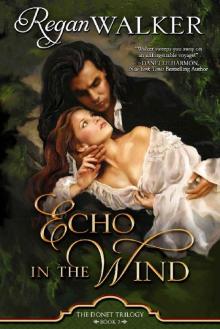 Echo in the Wind
Echo in the Wind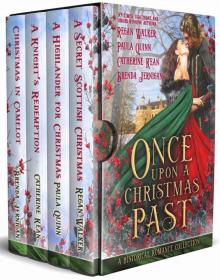 Once Upon a Christmas Past
Once Upon a Christmas Past A Secret Scottish Christmas (Agents of the Crown Book 4)
A Secret Scottish Christmas (Agents of the Crown Book 4)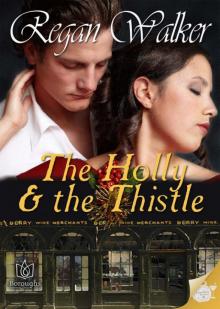 The Holly and the Thistle
The Holly and the Thistle Racing with the Wind (Agents of the Crown)
Racing with the Wind (Agents of the Crown) Wind Raven (Agents of the Crown)
Wind Raven (Agents of the Crown) Rebel Warrior (Medieval Warriors #3)
Rebel Warrior (Medieval Warriors #3)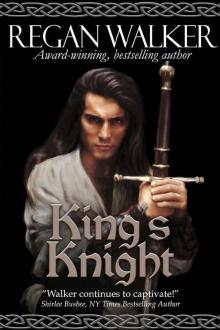 King's Knight (Medieval Warriors Book 4)
King's Knight (Medieval Warriors Book 4)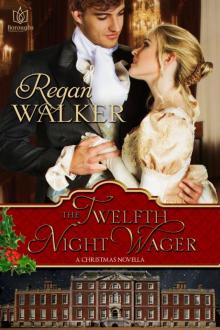 The Twelfth Night Wager
The Twelfth Night Wager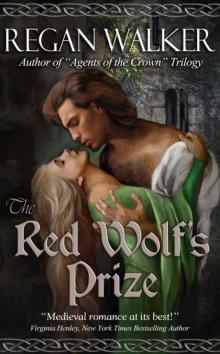 The Red Wolf's Prize
The Red Wolf's Prize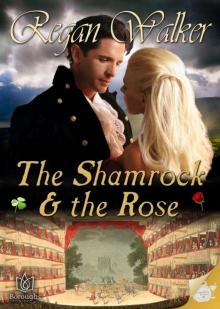 The Shamrock & the Rose
The Shamrock & the Rose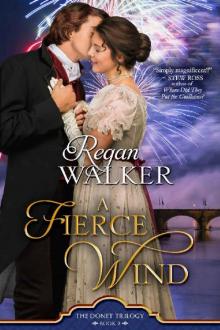 A Fierce Wind (Donet Trilogy Book 3)
A Fierce Wind (Donet Trilogy Book 3)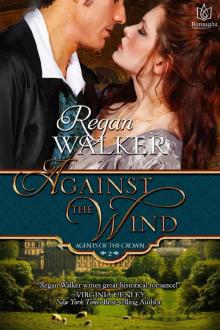 Against the Wind (Agents of the Crown Book 2)
Against the Wind (Agents of the Crown Book 2)